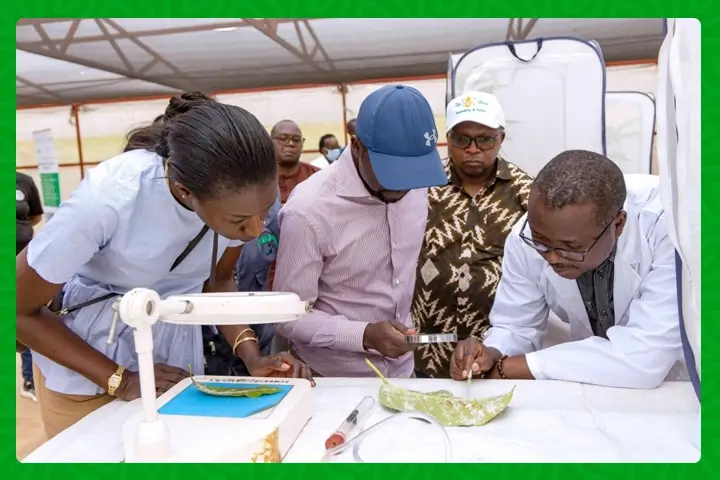
In a landmark initiative aimed at revitalizing mango production, the Ministry of Agriculture and Animal Resources (MINAGRI), in collaboration with the United Nations’ Food and Agriculture Organization (FAO), has launched a comprehensive campaign to eradicate mango mealybugs across Rwanda. The persistent pests have severely impacted mango crops, leading to significant shortages in markets both domestically and beyond. This concerted effort, which commenced on June 11 in Nyanza District, Southern Province, represents a critical step towards sustainable pest management and enhanced agricultural productivity.
The Launch of the Campaign
The campaign’s inauguration took place in Karuyombe Cell, Cyotamakara Village, Ntyazo Sector, Nyanza District, on a five-hectare mango and avocado farm. This farm stands as a testament to effective pest control, having maintained minimal levels of mealybug infestation. The event underscored the feasibility of managing and potentially eradicating these pests, offering a beacon of hope for farmers across the nation.

The Impact of Mealybugs on Mango Crops
Over the past three years, mango mealybugs have wreaked havoc on mango fruit trees, causing widespread shortages in markets. This pest infestation has not only led to economic losses for farmers but has also affected the government’s revenue. Dr. Ildephonse Musafiri, Minister of Agriculture and Animal Resources, highlighted the severity of the issue, noting that fruit trees and other plants nationwide are under threat from these pests.
Integrated Pest Management (IPM): A Sustainable Solution
To combat the mealybug menace, MINAGRI and FAO are promoting Integrated Pest Management (IPM). This approach combines biological, chemical, physical, and crop-specific strategies to manage pest populations sustainably and grow healthy crops with minimal pesticide use. IPM aims to offer a long-term solution by enhancing resistance to pests and diseases, ensuring a brighter future for mango farming.
Educational Campaigns and Preventive Measures
The campaign includes educational sessions for residents, focusing on preventive and combative measures against mealybugs. Key strategies include rustling trees to disturb mealybugs, regular weeding and cleaning of fields to eliminate breeding grounds, and proper cleaning of equipment to prevent infestations. When alternative methods prove ineffective, the use of pesticide applications is recommended.
Minister Musafiri emphasized the importance of knowledge in combating mealybugs. Through the Rwanda Agriculture and Animal Resources Development Board (RAB), the ministry aims to raise awareness, teach farmers effective pest control techniques, and empower them to combat pests independently. This approach is expected to increase harvests and eradicate the pest.
FAO’s Role and International Collaboration
Coumba Sow, the Country Representative of FAO in Rwanda, stated that FAO, as a technical agency, supports the government in addressing agricultural issues, including plant pests and diseases. FAO has brought in experts who have successfully dealt with similar issues in other regions, particularly in West Africa and neighboring countries. The organization is fostering collaboration with government institutions such as RAB, REMA, RICA, and NAEB, training technicians and local farmers on biological control methods like using flies to combat mealybugs.
FAO’s efforts have included training 158 extensionists and 6000 farmers through campaigns, teaching them the easiest, quickest, and safest ways to combat mealybugs. Sow expressed satisfaction with the campaign’s results, highlighting the importance of mangoes for economic growth and nutrition in Rwanda.
Farmer Testimonials
Local farmers have expressed optimism about the campaign. Prudence Sendarasi, a farmer from Cyotamakara Village, shared his positive experiences with pest management. Since 2017, he has received substantial support from RAB and FAO, including a modern sprayer. Sendarasi emphasized the importance of regular maintenance and pest control, which has helped him and his fellow farmers manage mealybug infestations effectively.
Coretta Uwamahoro, a farmer promoter in Karuyombe Cell, noted the significant impact of training and pesticide provision from FAO. She highlighted that the campaign has increased farmers’ awareness and ability to combat pests, leading to healthier crops and higher yields.
Observing Biological Control Methods
The delegation also visited the RAB biological control laboratory, established with FAO’s support. Here, they observed how natural enemies are used to combat mealybugs. The tour also included visits to the soil lab, the mushroom center, a beekeeping project in Rubona, and the regional food processing industry in Huye District, showcasing FAO’s comprehensive support for Rwanda’s agricultural sector.
The nationwide campaign to eradicate mango mealybugs launched by MINAGRI and FAO represents a critical effort to revive mango production in Rwanda. Through the promotion of Integrated Pest Management, educational initiatives, and international collaboration, this campaign aims to provide sustainable solutions to pest management, enhance agricultural productivity, and secure a brighter future for mango farmers. The success of this campaign holds promise not only for the agricultural sector but also for the overall economic and nutritional well-being of the country.
Original article article written by Frank Ntarindwa
Stay updated with the latest farming tips and agriculture industry news from Africa by subscribing to our newsletter. Don’t miss out on valuable insights and updates. Follow us on Twitter, LinkedIn, and Facebook to join our farming community and stay connected with us.


















